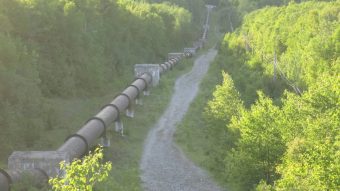
Trudeau doesn’t seem to understand what ‘climate emergency’ means.
Canadian Prime Minister Justin Trudeau is riding a rollercoaster of public opinion these days. Many Canadians were pleased with the House of Commons’ declaration of a climate emergency on Monday, a motion put forward by Environment and Climate Change Minister Catherine McKenna that follows in the footsteps of several Canadian cities. As the CBC reported, this declaration requires that
“Canada commit to meeting its national emissions target under the Paris Agreement and to making deeper reductions in line with the Agreement’s objective of holding global warming below two degrees Celsius and pursuing efforts to keep global warming below 1.5 degrees Celsius.”
But the happiness lasted only until Tuesday. PM Trudeau jetted back to Ottawa from Toronto where he’d been celebrating the Raptors’ NBA win (the House of Commons vote took place without him) and announced he was approving the Trans-Mountain pipeline expansion project. From the CBC:
“The cabinet has affirmed the National Energy Board’s conclusion that, while the pipeline has the potential to damage the environment and marine life, it’s in the national interest and could contribute tens of billions of dollars to government coffers and create and sustain thousands of jobs.”
Trudeau ‘reassured’ Canadians that every dollar made from the pipeline will be used to invest in unspecified clean energy projects. “We need to create wealth today so we can invest in the future,” he said. “We need resources to invest in Canadians so they can take advantage of the opportunities generated by a rapidly changing economy, here at home and around the world.”
It’s a head-scratcher of a decision, especially following Monday’s declaration. Patrick McCully of the Rainforest Action Network likened it to “declaring war on cancer and then announcing a campaign to promote smoking.” Green Party leader Elizabeth May said “the plan to invest profits from Trans Mountain into clean technology is a ‘cynical bait-and-switch that would fool no one'” (via CBC). NDP leader Jagmeet Singh said it’s irresponsible in light of Canada’s obligations to the Paris Agreement to reduce emissions.
Trudeau created an intense controversy by deciding to buy the pipeline in April 2018 for $4.5 billion in the midst of investor uncertainty; but then a court decision blocked construction in August, ruling that further environmental assessments and more consultation with indigenous groups were needed. Trudeau says he has met these requirements and is now ready to proceed. Some Indigenous groups disagree, calling his consultation “shallow.”
It’s a strange move in a world where divestment from fossil fuels is gathering momentum. Activist Bill McKibben wrote a few months ago about the numerous universities, colleges, and religious institutions that have opted to sell their shares in oil, gas, and coal companies – and they’re not hurting because of it:
“Early divesters have made out like green-tinged bandits: since the fossil fuel sector has badly underperformed on the market over recent years, moving money into other investments has dramatically increased returns. Pity, for instance, the New York state comptroller Thomas DeNapoli – unlike his New York City counterpart, he refused to divest, and the cost has been about $17,000 per pensioner.”
Surely, if Trudeau’s main concern is economics, there are better ways to generate wealth and financial stability for Canadians, such as investing that $4.5 billion in green energy and other sustainable projects. These would have the added benefit (and cost savings) of preserving the natural environment, rather than destroying it through construction, transportation, and inevitable contamination, and improving public health, which experts say is already being seriously affected by climate change.
Alas, there seem to be few leaders willing to go out on a limb, fight against the status quo, and create the new world order that we need if we hope to keep the global warming average below 2C. And if Trudeau doesn’t know where to start, I’d point him to the Leap Manifesto, which lays out beautifully a plan for “a country powered entirely by renewable energy.”
As the authors of the manifesto wrote, “Caring for one another and caring for the planet could be the economy’s fastest growing sectors.” If only Trudeau were daring enough to believe it.
Source: www.treehugger.com
